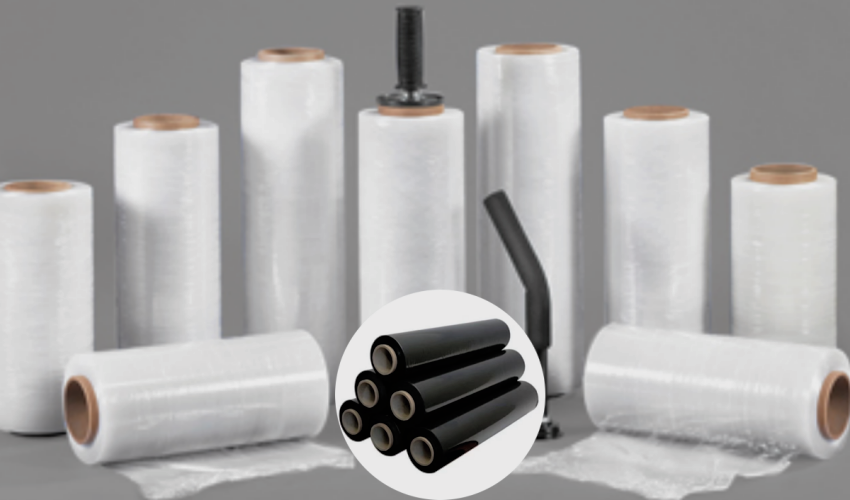
Biodegradable plastic stretch wrap is an innovative packaging solution that addresses the growing environmental concerns associated with traditional plastic. As businesses and consumers become increasingly aware of their ecological footprint, the demand for sustainable alternatives in packaging has surged. Biodegradable plastic stretch wrap offers a viable option, designed to decompose naturally and reduce landfill waste. Its significance in sustainable packaging lies not only in its ability to maintain product integrity during transportation but also in its contribution to minimizing plastic pollution. By adopting eco-friendly alternatives like biodegradable plastic stretch wrap, companies can enhance their environmental responsibility while still ensuring effective protection for their goods, ultimately leading to a more sustainable future in the packaging industry.
Biodegradable plastic stretch wrap is a type of packaging film designed to provide the same protective benefits as traditional plastic stretch wrap while offering a more environmentally friendly alternative. Made from materials that can decompose naturally, this stretch wrap features excellent cling properties, high elasticity, and durability, making it suitable for securing products during storage and transportation.
When compared to traditional plastic stretch wrap, biodegradable plastic stretch wrap stands out due to its commitment to sustainability. While conventional plastics can take hundreds of years to break down, biodegradable options utilize additives that facilitate a more rapid degradation process once exposed to certain environmental conditions, such as moisture and sunlight.
Biodegradable plastic shrink wrap, a related product, offers similar benefits with a focus on conforming tightly around items when heat is applied. This type of wrap ensures a snug fit, enhancing product protection while also breaking down naturally over time. The use of biodegradable plastic shrink wrap, alongside stretch wrap, demonstrates a growing trend in the packaging industry towards adopting materials that prioritize both functionality and environmental responsibility.
The environmental benefits of biodegradable plastic stretch wrap are significant. By reducing reliance on traditional plastics, businesses can help mitigate pollution and contribute to a more sustainable circular economy. When disposed of properly, biodegradable plastic stretch wrap can decompose into harmless byproducts like carbon dioxide, water, and biomass, ultimately reducing the overall impact on landfills and the environment.
Biodegradable plastic stretch wrap comes in various forms, each designed to meet specific packaging needs while promoting sustainability. Understanding the different types of biodegradable options available can help businesses make informed choices that align with their environmental goals.
Another option within the realm of biodegradable plastic stretch wrap is the biodegradable stretch wrap plastic sheet. These sheets are designed to be used in conjunction with various products, providing a versatile solution for packaging needs. They offer the same protective qualities as traditional stretch wrap while ensuring that they can decompose naturally after use. Businesses can utilize biodegradable stretch wrap plastic sheets for everything from securing palletized goods to wrapping individual items, effectively balancing product protection with environmental responsibility.
The variety of biodegradable stretch wrap options available empowers companies to select solutions that align with their sustainability initiatives, helping to foster a greener future.
Purchasing biodegradable plastic stretch wrap wholesale offers numerous advantages for businesses looking to enhance their sustainability efforts while managing costs. By buying in bulk, companies can significantly reduce their per-unit price, allowing for better budgeting and resource allocation. Additionally, bulk purchases can help ensure that there is a consistent supply of wrapping materials on hand, minimizing disruptions during production and shipping processes.
When opting for biodegradable stretch wrap, businesses also contribute to environmental sustainability, as these products decompose more readily than traditional plastic wraps. This commitment to eco-friendly practices can enhance a company’s reputation and appeal to environmentally-conscious consumers.
Networking within industry groups or attending trade shows can also provide valuable contacts and insights into reputable suppliers. Online marketplaces and directories can be useful for comparing prices and product availability. Additionally, requesting samples before committing to a bulk purchase can help businesses assess the quality and suitability of the biodegradable plastic stretch wrap for their specific needs.
Exploring wholesale options for biodegradable plastic stretch wrap not only offers cost savings but also aligns with sustainability goals, making it a strategic choice for businesses dedicated to reducing their environmental impact.
The price of biodegradable plastic stretch wrap can vary significantly based on several factors that impact its overall cost. Understanding these factors is crucial for businesses looking to incorporate sustainable packaging solutions while managing their budgets effectively.
Brand Reputation: Well-established brands with a reputation for quality and sustainability may charge more for their biodegradable stretch wrap, as customers are often willing to pay a premium for trusted products.
Type of Materials: The choice of materials significantly impacts cost. High-quality biodegradable materials, such as plant-based resins, often have a higher price tag compared to traditional petrochemical-based plastics.
Manufacturing Processes: Eco-friendly manufacturing practices typically involve more sophisticated processes, which can increase production costs. Suppliers that focus on sustainable practices may charge a premium for their biodegradable stretch wrap.
Scale of Production: The scale at which biodegradable stretch wrap is produced can affect pricing. Larger production runs usually lower costs due to economies of scale, while small batch production may lead to higher per-unit costs.
Supply Chain Dynamics: Fluctuations in the prices of raw materials, such as the cost of plant-based inputs, can influence the overall price of biodegradable stretch wrap. Supply chain disruptions can also lead to increased costs.
Customization Options: Custom features, such as specific widths, thicknesses, or colors, can result in variations in price. Tailoring products to meet specific customer requirements often incurs additional costs.
Market Demand: Increasing consumer awareness and demand for sustainable products can affect pricing. Higher demand for biodegradable options may lead suppliers to adjust prices based on market conditions.
| Feature | Biodegradable Plastic Stretch Wrap | Traditional Plastic Wrap |
|---|---|---|
| Initial Cost | Higher initial cost | Lower upfront price |
| Material | Made from biodegradable materials | Typically low-density polyethylene (LDPE) |
| Environmental Impact | Lower long-term impact | Higher long-term impact with waste management costs |
| Disposal | Breaks down into natural elements | Contributes to landfill waste |
| Economic Trends | Decreasing production costs due to technology | Stable, but with potential hidden costs |
While the price of biodegradable plastic stretch wrap can vary based on multiple factors, its long-term benefits for sustainability and the environment often outweigh the initial costs, making it a smart investment for businesses committed to eco-friendly practices.
As demand for sustainable packaging options rises, a growing number of manufacturers are innovating within the biodegradable plastic stretch wrap industry. These companies are at the forefront of developing eco-friendly alternatives to traditional plastic wraps, contributing to greener supply chains and reduced environmental impact.
Many manufacturers offer tailored solutions to meet the specific needs of different industries, such as wraps suitable for extreme temperatures, high-humidity environments, or light-sensitive products. By continuously pushing the boundaries of biodegradable plastic stretch wrap technology, these manufacturers help businesses meet sustainability goals while maintaining the integrity of their packaged goods.
Biodegradable plastic stretch wrap serves a variety of important functions in logistics, shipping, and storage, making it an essential tool for companies aiming to reduce their environmental footprint while maintaining efficiency.
Another example includes a packaging firm that introduced biodegradable plastic stretch wrap into their product line, allowing clients in various industries—such as retail and manufacturing—to package their goods sustainably. By doing so, they not only enhanced their competitive edge but also demonstrated their commitment to environmental responsibility.
These case studies highlight the versatility and effectiveness of biodegradable plastic stretch wrap in diverse applications, showing that companies can achieve both operational efficiency and sustainability through thoughtful packaging choices. As more businesses recognize the benefits, the adoption of biodegradable plastic stretch wrap is likely to continue growing across various sectors.
Traditional stretch film is not biodegradable. Most stretch films are made from polyethylene, a type of plastic derived from petrochemicals, which does not break down naturally in the environment. As a result, it can persist in landfills and oceans for hundreds of years. However, advancements in materials science have led to the development of biodegradable alternatives that are designed to decompose under specific conditions, such as in industrial composting facilities. These biodegradable films are often made from biopolymers and other renewable resources.
Biodegradable alternatives to conventional plastic wrap include products made from materials such as polylactic acid (PLA), which is derived from cornstarch or sugarcane. Another popular option is wraps made from beeswax-coated fabric. These materials are designed to break down more easily when exposed to the natural elements, promoting environmental sustainability. Moreover, these alternatives do not release harmful chemicals into the environment as they degrade, making them a safer choice for the planet.
Yes, plastic stretch wrap can often be recycled, but the process is not always straightforward. Many local recycling programs do not accept stretch film due to the difficulty in processing it. However, specialized recycling facilities and programs do exist that can handle this type of plastic. It is crucial to clean the stretch wrap and remove any contaminants before recycling to ensure it does not interfere with the recycling process. Contact your local recycling center for specific guidelines on recycling stretch film.
Yes, there are truly biodegradable plastics available, but their biodegradability depends on the specific conditions required for decomposition. For example, polylactic acid (PLA) is a type of biodegradable plastic that can decompose in industrial composting facilities but may not break down as easily in a typical landfill or marine environment. Other materials, such as polyhydroxyalkanoates (PHA), are designed to biodegrade more readily in a broader range of environments, including marine settings. These materials represent promising options for reducing plastic pollution, but their effectiveness depends on the proper disposal methods being followed.

My name is James Thompson, and I’m the editor of this website dedicated to Stretch Film, Pallet Wrap, and Stretch Wrap products.
My passion for packaging began when I noticed the challenges companies face in securing their products efficiently for transportation and storage. This inspired me to delve deep into the world of stretch films and pallet wraps, exploring the latest technologies and best practices.
I aim to provide valuable insights, practical tips, and up-to-date industry trends to assist you in making informed decisions. Whether you’re a small business owner or part of a large corporation, my goal is to support you in optimizing your operations and ensuring your products reach their destination safely.
Thank you for visiting, and I look forward to accompanying you on your journey toward better packaging solutions.
Comments are closed